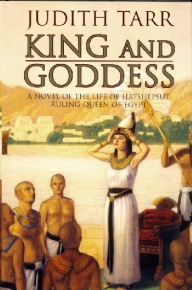

KING AND GODDESSby Judith TarrTor0-312-86092-7382pp/$23.95/August 1996 |
 |
Reviewed by Steven H Silver
From her recent output, it seems Judith Tarr has turned her back on fantasy novels, such as Alamut and The Hall of the Mountain King, in favor of writing nearly straight Egyptian historical fiction. Her first novel in this vein, Lord of the Two Lands, still contained elements of fantasy, although as she worked her way forward and backward through Egyptian history, the fantastic element began to take on less significance, eventually arriving at King and Goddess, Tarr's retelling of the history of Hapshetsut.
As Tarr points out in her afterword, the story of Hapshetsut has everything necessary to make a gripping story. Hatshepsut was a strong-willed woman who was tied to a man, Thutmose II, whose priorities were different than her own. Although she usurped her stepson's throne she was unable to establish her own dynasty, eventually leading to the eradication of her name in the following reign.
Unfortunately, King and Goddess fails to do justice to the story. Tarr fails to show much in the way of character interaction and relationships. Although she explains what their relationships are, we never really get to see Hatshepsut's hatred for Thutmose II or her love for Senenmut. Partly this is caused by the fact that so much of these interactions take place off stage or as glossed over by Tarr, but Tarr's treatment of her characters is much more narrative than it could otherwise be.
Further adding to this problem is Tarr's use of language throughout King and Goddess. Her characters all tend to speak with a very formal tone, whether to master, servant or relative. This gives the characters a very distant feel and it is difficult for the reader to form any attachment or sympathy with the characters. The fact that neither Hatshepsut or Senenmut are presented as particularly likable characters also stands in the reader's way of becoming too involved with the story.
King and Goddess does provide a good examination of the dichotomy between duty and desire. Tarr's depiction of Hatshepsut is a model of duty. She does her duty, and no more, to Thutmose in an attempt to provide an heir. Thutmose actually seems to desire Hatshepsut and is willing to do whatever is necessary, only to have his advances spurned. When Thutmose leaves the capital to go hunting or off to war, he only increases Hatshepsut's disdain for him and what she sees as his inability to do his duty to Egypt, stepping in to his place as she believes her duty is. Even Hatshepsut's relationship with Senenmut is devoid of any sense of passion or desire, on either Hatshepsut's or Senenmut's part.
Where Tarr does excel is bringing to life the culture of Ancient Egypt, although not necessarily the daily life. In this area, Tarr demonstrates her training as an historian. She has quite obviously done her research into the period and can portray it and the events accurately. What she needs to bring it together is a feel for dialogue and the ability to show characters interacting with each other. Tarr has shown she can do these things in earlier works. With luck, King and Goddess is merely an aberration in her output.
